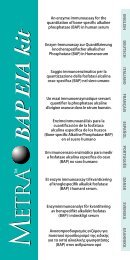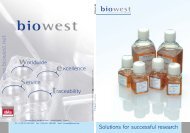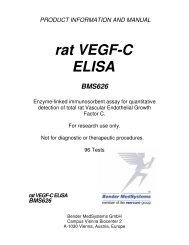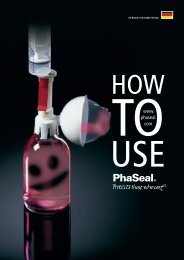You also want an ePaper? Increase the reach of your titles
YUMPU automatically turns print PDFs into web optimized ePapers that Google loves.
Tumour Vaccination with Dendritic Cells:<br />
Tumour cells express specific proteins which can be recognized as antigenic determinants by<br />
T-cells. As a rule, however, this is not sufficient for the immune system to generate an effective<br />
immunoresponse against tumour cells; there is rather a tolerance. On the one hand this is because<br />
tumour-associated antigens are often also found in sound tissue in a low density; on the other<br />
hand tumour cells have numerous strategies to escape an immunoresponse. In a number of animal<br />
experiments, however, it could be clearly shown that this tolerance for tumours can be broken by<br />
a vaccination with dendritic cells.<br />
Generation of Dendritic Cells:<br />
Dendritic cells are derived from hematopoetic precursor cells in the bone marrow. Three different<br />
subpopulations with each characteristic features and functions are described for the human being:<br />
myeloid dendritic cells, plasmacytoid and Langerhans cells of the skin. For tumour vaccinations,<br />
myeloid dendritic cells are mainly of interest as they are especially capable of taking up and<br />
presenting antigens. Dendritic cells with myeloid characteristics can be produced by an in vitro<br />
culture of monocytes in the presence of the cytokines interleukin-4 (IL-4) and granulocytesmacrophages<br />
colony-stimulating factor (GM-CSF). Alternatively dendritic cells can be generated<br />
from CD34+ hematopoetic stem cells of the peripheral blood.<br />
By the addition of growth factors, e.g. Klt3-ligand, dendritic cells in the blood, which normally make<br />
up only approx. 0,1 - 0,5 % of the mononuclear cells, can be expanded many times over.<br />
After activation, dendritic cells reach their full capacity for the T-cell stimulation. For the maturation<br />
of the dendritic cells, cytokines (TNF alpha), LPS or monocyte-conditioned medium are used.<br />
Production and serumfree cultivation of dendritic cells from mononuclear cells<br />
of peripheral blood (PBMC)<br />
PAN-Biotech has developed an optimised medium for the serumfree cultivation of dendritic cells.<br />
PANSERIN TM 416 (basic medium) is supplemented by the growth factors delivered with it and thus<br />
allows the serumfree cultivation of dendritic cells.<br />
Separation of Blood with Separating Medium (Pancoll 1,077 g/ml)<br />
The blood samples should be processed as soon as possible after production in order to<br />
achieve optimal results. A storage of the blood samples for 24 hours at ambient<br />
temperature causes among other things a reduced output of lymphocytes, a change of<br />
the surface markers and a reduced response on mitogen stimulation.<br />
1) Add Pancoll (3 ml) into a suitable, sterile centrifuge tube under sterile conditions.<br />
2) Carefully coat the separating medium with the diluted blood sample (4 ml). Important: Don’t mix the blood sample with Pancoll!<br />
3) Centrifugation at 400 x g for 30 - 40 minutes at 18 - 20 °C.<br />
4) After the centrifugation, carefully take off the upper phase (containing serum and platelets) with a pipette without mixing the<br />
interphase with the lymphocytes.<br />
5) Transfer the lymphocyte band into a new centrifuge tube with a new pipette. Here it is important to take off the whole material<br />
of the interphase with as little volume as possible.<br />
6) Add at least 3 volumes of a physiological saline solution (6 ml) to the lymphocytes.<br />
7) Carefully suspend the lymphocytes with a pipette.<br />
8) Centrifugation at 60 - 100 x g for 10 minutes at 18 -20 °C.<br />
9) Reject the supernatant.<br />
10) Repeat washing step (point 6 - 9).<br />
BIOTECH GmbH<br />
<br />
The company<br />
Am Gewerbepark 13, D-94501 Aidenbach<br />
phone +49 (0) 85 43 - 60 16-30, fax +49 (0) 85 43 - 60 16-49<br />
e-mail: info@pan-biotech.de, http://www.pan-biotech.de<br />
14



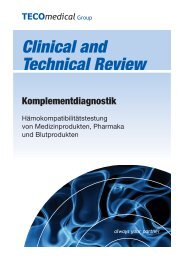
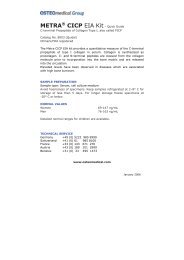
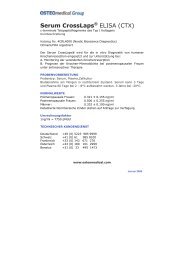
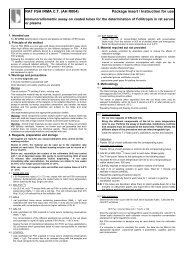
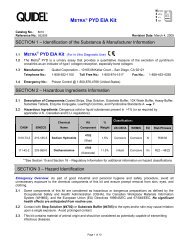

![PTH [Hormone Parathyroïdienne] Intacte ELISA](https://img.yumpu.com/1233682/1/190x245/pth-hormone-parathyroidienne-intacte-elisa.jpg?quality=85)
